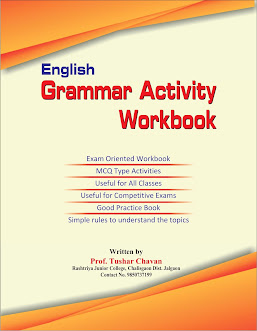Common Errors- Avoid these Error
1) ‘Since’
for ‘For’.
Wrong: He’s lived here since two years.
Right: He's lived here for
two years.
Place the preposition "for" before words or phrases denoting a period of time: for three days, for six weeks, for two years, for a few minutes, for a long time. Use it with any tense except the present.
2) ‘From’
for ‘Since’.
Wrong: Raju has been ill from last Friday.
Right: Raju has been ill since
last Friday.
Place the preposition "since" before words or phrases denoting a point in time:
since Monday,
since yesterday,
since eight o'clock,
since Christmas.
When we use since, the verb is usually in the present perfect tense, but it may be in the past perfect:
e.g.
I was glad to see Anil.
I
hadn't seen him since last Christmas.
Note:
"From" can also denote a point in time, but it must be followed by "to" or "till":
e.g.
He works from eight
o'clock till one o'clock without a break.
3) Shall
and Will.
(a) To express 'simple future tense':
In the first person:
Wrong: I will go tomorrow if
it's fine.
Right: I shall go tomorrow
if it's fine.
In the second person:
Wrong: She tells me you
shall go tomorrow.
Right: She tells me you
will/'ll go tomorrow.
In the third person:
Wrong: He shall go, if he has
permission.
Right: He will go, if he
has permission.
(b) To
express something more than simple future tense:
In the first person:
Wrong: I have determined
that I shall go.
Right: I have determined
that I will go.
In the
second person:
Wrong: You will go out
if you are good.
Right: You shall go out if
you are good.
In the
third person:
Wrong: My mind is made up:
he will go.
Right: My mind is made up:
he shall go.
To form the simple future, use "shall" with the first person and "will" with the second and third persons.
"Will" in the first person denotes resolution or personal
determination, and "shall" in the second and third persons denotes
either a command or a promise.
Note:
"Should", the past tense of "shall", and "would", the past tense of "will", have the same differences of meaning and use as the present forms "shall" and "will":
e.g.
I was afraid that I should fail.
I
promised that I would help him.
4) Sit and
Seat.
(a) Sit
Wrong: We seat at a desk to
write a letter.
Right: We sit at a desk to write a letter.
(b) Seat
Wrong: He sat the passengers
one by one.
Right: He seated the passengers one by one.
Use "sit" as an intransitive verb. "Seat" is a transitive verb and requires an object.
Mostly the object of "seat" is a reflexive pronoun:
e.g.
He seated himself near the fire.


.png)

















2 Comments